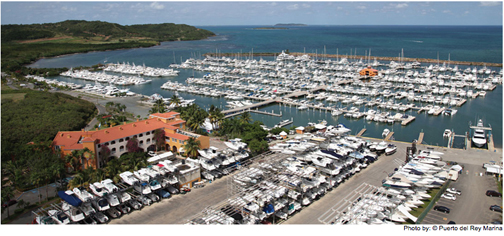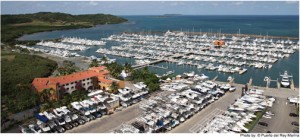EPA releases manual to reduce pollution at marinas


the EPA will host a Compliance Assistance and Pollution Prevention Workshop for marina owners and operators at Marina Puerto del Rey in Fajardo. (Credit: www.puertodelrey.com)
The U.S. Environmental Protection Agency has made a series of recommendations to marinas in Puerto Rico and the U.S. Virgin Islands that will reduce pollution, compiled in a manual the agency has written with assistance from the Puerto Rico Department of the Environment and Natural Resources, Puerto Rico SeaGrant, the Sea Grant Program of the University of the Virgin Islands and Blue Flag.
The publication has been provided to more than 40 marina operators and offers recommendations on ways marina owners and operators can reduce pollution through more efficient use of materials, energy and land.
“Marina operators need to work to protect the health of our coastal waters and beaches,” said EPA Regional Administrator Judith A. Enck. “Because marinas are located at the water’s edge, chemicals used in boat maintenance can flow into the water and cause serious damage to the marine environment.”
“The EPA is working with the marina industry to ensure that marina operators are aware of the best ways to reduce pollution in this sensitive water environment. Towards this end, we also recommend that marina facilities participate in certification programs to achieve high standards in environmental management and safety,” she said.
Key recommendations for preventing water pollution from boat operations and maintenance include:
- Regularly inspect above-ground fuel storage tanks and associated piping for leaks, and ensure that these tanks have secondary containment areas to contain spills.
- Store spill containment and control materials in a clearly marked and easily accessible location near the fuel dock. Keep oil absorbent pads and pillows available at the fuel dock for staff and customers to mop up all drips and small spills.
- Avoid underwater boat bottom cleaning or hull scraping to remove antifouling paint from boat hulls.
- Collect wash water, treat it and either dispose of it at a sewage treatment plant or reuse it.
- Perform as much boat repair and maintenance as practicable inside work buildings. Where an inside workspace is not available, perform abrasive blasting and sanding within spray booths or tarp enclosures.
- Use cleaning products that are less toxic or nontoxic and contain lower concentrations of volatile organic compounds, ozone depleting chemicals and toxic materials. Always clean with water and a coarse cloth first.
- Permanently seal floor drains in maintenance areas with concrete if they do not connect to a sewer or holding tank. Sweep or vacuum floors often and immediately before floor washing.
- Minimize impervious areas on the marina site by paving only where absolutely necessary. Plant a vegetated buffer between impervious areas and the marina basin.
On April 2, the EPA will host a Compliance Assistance and Pollution Prevention Workshop for marina owners and operators. Among the topics the EPA will cover at this workshop are: on-site boat maintenance, fuel management, stormwater management and regulatory requirements, emergency planning for the hurricane season and green marina certification programs.
The workshop will take place at the Puerto Del Rey Marina in Fajardo from 9 a.m. to 12 p.m.





